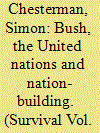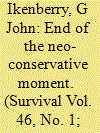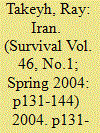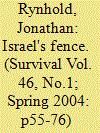|
|
|
Sort Order |
|
|
|
Items / Page
|
|
|
|
|
|
|
| Srl | Item |
| 1 |
ID:
051418


|
|
|
|
|
| Publication |
2004.
|
| Description |
p101-116
|
| Summary/Abstract |
Would greater UN involvement have avoided any of the mistakes made by the Coalition Provisional Authority (CPA) in administering Iraq? Three of the most egregious errors – failing to provide for emergency law and order, disbanding the Iraqi army and blanket de-Ba'athification – ran counter to lessons from previous operations. But the greatest mistake by US planners may have been the assumption that previous UN nation-building efforts have achieved limited success because of UN incompetence, rather than because of the inherent contradictions in building democracy through foreign military intervention. The United States is now engaged, in Afghanistan and Iraq, in two of the most ambitious nation-building projects in its history. The US took a predominant role in part because of the circumstances in which the two conflicts commenced, but also as an extension of the present administration's more general suspicion of multilateral institutions such as the United Nations. This suspicion now undermines the chances of either operation concluding successfully.
|
|
|
|
|
|
|
|
|
|
|
|
|
|
|
|
| 2 |
ID:
051401


|
|
|
|
|
| Publication |
2004.
|
| Description |
p7-22
|
| Summary/Abstract |
In the past two years, a set of hard-line, fundamentalist ideas have taken Washington by storm and provided the intellectual rationale for a radical post-11 September reorientation of American foreign policy. But this new fundamentalism has turned into a costly misadventure. As a grand strategic approach to global leadership, it has failed. It is hard to think of another instance in American diplomatic history where a strategic wrong turn has done so much damage to the country's international position – its prestige, credibility, security partnerships and the goodwill of other countries – in such a short time, with so little to show for it. A single-minded American campaign against terrorism and rogue states in which countries are either ‘with us or against us’ and bullied into support is not leadership but a geostrategic wrecking ball that will destroy America's own half-century old international architecture. Long after the new fundamentalist thinking fades away, American diplomats will be repairing the damaged relations and political disarray it wrought.
|
|
|
|
|
|
|
|
|
|
|
|
|
|
|
|
| 3 |
ID:
051417


|
|
|
|
|
| Publication |
2004.
|
| Description |
p77-99
|
| Summary/Abstract |
Although the threat of mass casualty terrorism has altered strategic priorities in the United States, the global community as a whole faces many of the same problems that it faced in the 1990s: civil wars; failed or failing states; and other humanitarian disasters around the world. The gap between the demands on the international community to do something about these catastrophes and its ability to respond remains wide. The challenge to create a truly global capacity for peacekeeping and humanitarian intervention is difficult, but not so daunting or expensive as to excuse inaction. With minimal investments, which would primarily entail states shifting military resources and force structures towards more useful ends, superior global capabilities to make a difference are achievable.
|
|
|
|
|
|
|
|
|
|
|
|
|
|
|
|
| 4 |
ID:
051420


|
|
|
|
|
| Publication |
2004.
|
| Description |
p131-144
|
| Summary/Abstract |
Iran today is on the verge of its most acute crisis since the 1979 revolution, as the political impasse of the past few years is turning to active confrontation between a restive populace and an inflexible theocracy. In contrast to the triumph of reformist candidates in the 2000 elections, which fostered hopes of a democratic breakthrough, the political climate leading up to the February elections reflected the success of the conservative backlash. However, the success of the conservatives' strategy contains the seeds of their own destruction. By obstructing a peaceful reform movement, the hardliners have ensured that the popular clamour for change will escape the confines of conventional politics and assert itself through defiance and protest.
|
|
|
|
|
|
|
|
|
|
|
|
|
|
|
|
| 5 |
ID:
051416


|
|
|
|
|
| Publication |
2004.
|
| Description |
p55-76
|
| Summary/Abstract |
Israel's security barrier is under construction and it is likely to be finished, so arguments about whether it should be built at all are pretty much academic. Far more important now is the nature and route of the barrier. Routes that go too deep into West Bank territory, that cut off and isolate Palestinian villages and encompass remote Israeli settlements are indeed likely to heighten the Palestinians' humiliation, harm them economically, and provoke worsened violence and terrorism. But other routes, closer to the ‘Green Line’, could exert more positive influence, not least because they would logically entail the abandonment of unviable settlements. A sensibly routed barrier has the potential not only to help protect Israelis from terrorists, but also to make a broader strategic contribution as a mechanism for managing the conflict and as a back-up plan as the prospects for a formal agreement fade.
|
|
|
|
|
|
|
|
|
|
|
|
|
|
|
|
| 6 |
ID:
051419


|
|
|
|
|
| Publication |
2004.
|
| Description |
p117-130
|
| Summary/Abstract |
Perhaps no president had a clearer vision of reducing nuclear dangers than Ronald Reagan, who also understood the need for bold initiatives to galvanise public opinion and governmental action. In 1986, Reagan proposed to eliminate offensive ballistic missiles. The Soviets refused, but Reagan's ‘Zero Ballistic Missiles’ (ZBM) proposal is worth re-examining as a means of dealing comprehensively with ballistic missile threats. Global ZBM would eliminate risks associated with thousands of US and Russian ballistic missile warheads that remain on ‘hair-trigger’ alert, and would simplify the challenge of missile defence. Global ZBM would also halt China's strategic missile modernisation programme and remove the most dangerous weapons from regional arsenals in the Middle East, southwest Asia and the Korean Peninsula.
|
|
|
|
|
|
|
|
|
|
|
|
|
|
|
|
| 7 |
ID:
051414


|
|
|
|
|
| Publication |
2004.
|
| Description |
p23-37
|
| Summary/Abstract |
American foreign policy will more effectively counter Islamist terrorism if it more effectively counters the terrorists' invocation of Islam. The indirect promotion of religious tolerance in the Muslim world, rather than direct promotion of Western-style democracy, is the key. To that end, the United States must cultivate Muslim human-rights activists and intellectuals as assiduously as it did their Soviet counterparts during the Cold War. First, however, it must reassert the constitutional separation of church and state that some Americans seem eager to blur. No velvet revolution impends in any case: the Muslim political future will probably look more like Yugoslavia than Czechoslovakia. But long-running internecine conflicts may have left the umma in a state of exhaustion analogous to Europe's at the end of the Thirty Years War. There is, in short, a moment to be seized if American diplomacy can muster the cultural sophistication to seize it.
|
|
|
|
|
|
|
|
|
|
|
|
|
|
|
|
| 8 |
ID:
051415


|
|
|
|
|
| Publication |
2004.
|
| Description |
p41-54
|
| Summary/Abstract |
The failure of the Oslo process and the surge of violence since September 2000 have highlighted the unbridgeable gap that separates Israelis and Palestinians. After 11 September 2001, Western policies in the region have been faced with two choices. A ‘Palestine-first’ option would emphasise the centrality of the Palestinian–Israeli dispute to the region and seek to solve it, in the expectation that a solution will make it easier to cure the other ills of the greater Middle East. Yet the correlation between Palestine and these other problems is tenuous at best. The Bush administration correctly has chosen a second strategy: putting Palestine last. A solution to other regional problems might well prepare the ground for an eventual resolution of the Palestinian–Israeli dispute. Until conditions change, the best strategy is to significantly lower expectations, substituting conflict management for conflict resolution.
|
|
|
|
|
|
|
|
|
|
|
|
|
|
|
|
|
|
|
|
|